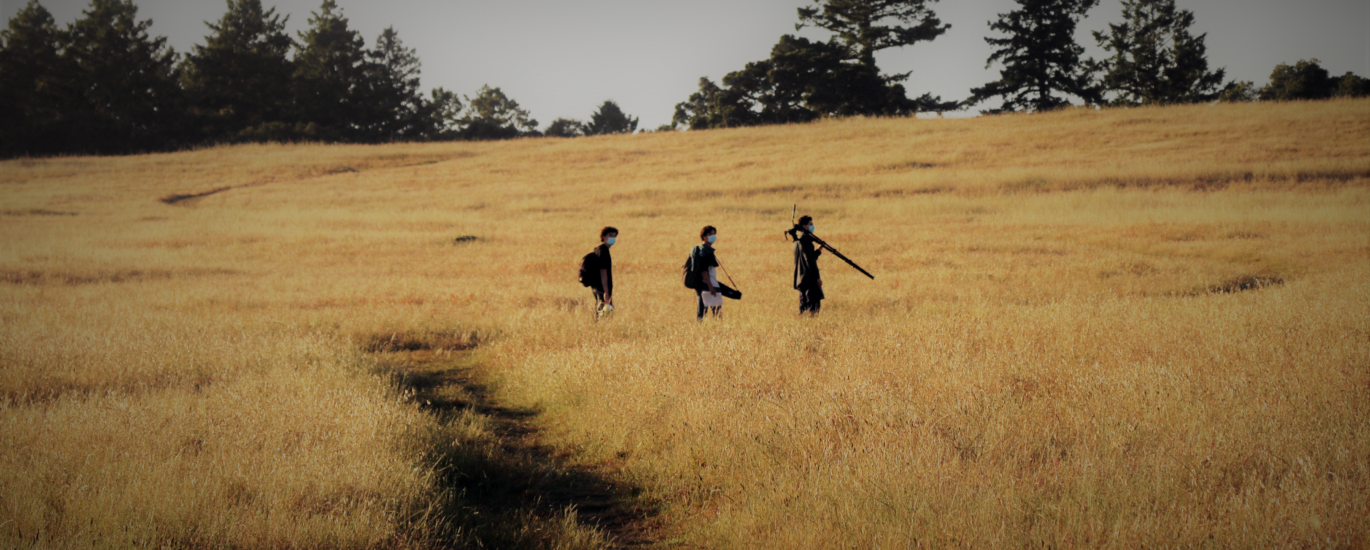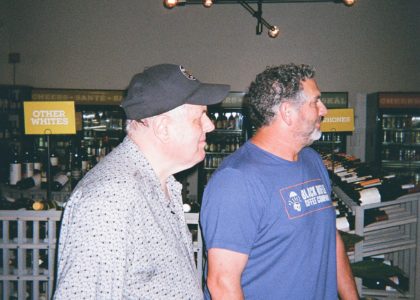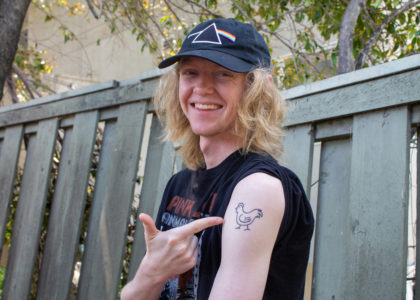By Rebecca Caraway
Jack Berkenfield is a corporate video editor and worked as a producer on an award-winning short film. Grace Tucker is the assistant director for the San Luis Obispo international film festival. Dylan Martin worked under the lead animatics assistant for Disney’s live action “The Little Mermaid.” Molly Barry works to remake movie trailers for countries around the world.
All of these Cal Poly graduates work in the entertainment industry, but none of them majored in film. Instead, they studied English, journalism, business and experience industry management.
Cal Poly does not offer a film major, but pathways into film and entertainment are plentiful. Here are some of the ways that graduates have launched their careers without the major.
Video by Avery Elowitt
Bringing business to entertainment
While Grace Tucker was still attending Cal Poly, a professor from her media, arts, and technology minor connected her with the San Luis Obispo International Film Festival. After five years with the team, she is now the assistant director.
Each year, students from lecturer Randi Barros’ cinematic processing class work with students from digital video II to make short films for the film festival. In 2017, Tucker was among them.
Tucker’s passion for media arts combined with her skillset in the business industry prepared her for becoming assistant director.

“My job is both the creative and the administrative side of things,” Tucker said. “I think being a business marketing major, and then also the film side of it all worked with my major and minor choices pretty seamlessly.”
The classes Tucker took for her minor expanded her passion for film. In a screenwriting class, she studied other scripts which taught her what elements are needed for a good script, eventually leading Tucker to creating her own. The screenwriting class made her see storytelling in a new light.
Another class Tucker took allowed her to watch a movie each week within the same genre.
“That one was great,” Tucker said. “Even if you don’t like a movie, it allowed you to kind of understand what makes it good.”
Tucker’s summer is spent fundraising and accepting submissions for the next year’s festival. In the fall they start watching the movies and planning events for the festival. As the festival approaches in spring, Tucker gets to flex her creativity.

“You’re kind of able to be creative and come up with what events will be around a certain film, and how can we make it more than just screening the film,” Tucker said.
The most rewarding part of Tucker’s job is to see a years-worth of work finally paying off during the festival, she said.
“To see it all come to fruition in that one week, and just getting to meet everyone and to see how much fun they’re having,” Tucker said. “The week of the festival is just the big payout reward.”
Tucker’s advice to aspiring filmmakers is to network as much as possible and to get an internship in the industry they want to work in.
“Do any kind of internship that you can just so that you have that in your back pocket and make friends with everyone that you meet in the industry,” Tucker said. “Join any clubs that could just kind of boost that resume any way that you can. And just stay interested in film.”

Behind-the-scenes of upcoming student-run short film, Vigilius Haufniensis.
From journalism to production
When journalism student Berkenfield graduated Cal Poly in 2020, he had his heart set on working in a news station. However, the lack of newsroom jobs during the pandemic led him to working in corporate video and film.
“Cal Poly was huge for me,” Berkenfield said. “The ‘learn by doing’ thing is really important for the career that I chose.”
Berkenfield spent a lot of his undergrad time working as a video editor and participating in broadcast events. Additionally, he said, his classes taught him the importance of deadlines.
“Editing could kind of take forever if you were allowed to take forever,” Berkenfield said. “The importance of time pressure and commitment to deadlines that I learned in journalism really, really applied.”
After graduation, Berkenfield worked as a co-producer for the short film “The Phoenix.” Pre-production proved challenging for Berkenfield, considering his background/education was in post-production. Filming in California provided many conflicts for production, due to the hot summer weather. While it was rewarding to see the final project, Berkenfield says he’ll stick to the post-production side of filmmaking.
“The Phoenix” has been shown at over 30 film festivals and has won 15 awards. 
“I think seeing the fruits of your labor is really rewarding,” Berkenfield said, adding that hard work goes a long way toward securing future jobs.
“Once people trust that you can get the work done, they’ll just feed you work forever,” Berkenfield said. “As soon as they trust you, they don’t want to go to somebody else. So the most important thing for post production is really establishing yourself that way, and that you can do it.”
Molly Barry from experience industry management to TV trailers
When Molly Barry graduated with an experience industry management degree in 2015, she wasn’t planning on pursuing entertainment. Now, she works as a senior account manager for the entertainment company, Deluxe.
At Cal Poly, Barry’s major consisted of a lot of group projects. In each project, Barry had to schedule events, manage budgets, and work with other companies. She carries this skillset into her current role with Deluxe.
Barry works on localizing movie and TV trailers for countries around the world. The company’s main client is Amazon Prime.
Last summer, she worked on 80 trailers for the “Lord of Rings: Rings of Power” TV show in 34 different languages. “That was a huge undertaking, but I came out the other side of it and learned a lot,” Barry said.
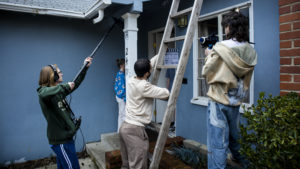
Students set up their shot for upcoming short film, Lost.
One part of her job involves staying up during other countries’ working hours in case studios have any questions or the trailer needs to be fixed.
“Once we deliver to the client, we start seeing those trailers on TV,” Barry said. “It’s a cool thing to have that final product.”
An English major working as a film editor
As a kid, Dylan Martin wanted to work in film but was hesitant. Many people encouraged him to pursue a more stable career path; telling him that the film industry wasn’t viable.
“Being a first generation college student, I wasn’t really sure,” Martin said.
Going to Cal Poly made Martin feel like he wouldn’t be successful or make any money unless he was a STEM major, he said. However, he eventually learned that as long as he worked hard on everything he did, he could be just as successful as people in STEM.
Unsure of what he would do after graduating college, Martin thought of changing his major. However, he didn’t want to add an extra year of school.
“Because I was so confused about what I wanted to do going into Cal Poly, I grew a lot from that experience of trying to figure it out,” he said.

The summer before his senior year, Martin was offered a job as an animatics position by someone he met in Los Angeles and had kept in touch with throughout college. During this summer he worked as an animatic assistant for Disney’s live action “Lady and the Tramp.”
“It was the validation I needed going into my senior year,” Martin said. “I knew I was going to go into film.”
During his senior year, Martin took a storytelling and cinematic process class, taught b Barros. The class gave him a glimpse of filmmaking as a profession, and introduced him to like-minded students. Many of which he still works with today in Los Angeles.
Taking Barros’ storytelling class meant that Martin would be taking 20 units during the fall quarter of his senior year. Despite the challenge, he decided it would be worth it to take a class he was passionate about.
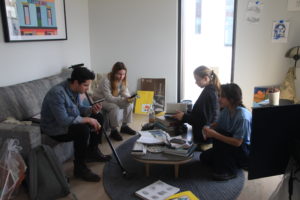
ISLA students collaborate on their short film for the SLO Film Festival.
After graduation, Martin rejoined the animatics team from “Lady on the Tramp,” this time as an assistant for the lead animatic assistant on Disney’s live action “The Little Mermaid.” He acted as support for the animatic editor as well as helping with sound, occasionally recording scratch dialogue. Martin said he enjoyed working with other editors who were able to show him the ropes.
“The collaboration aspect is very rewarding,” Martin said. “There’s so many people out there who are just willing to kind of help you out. If you’re someone that is driven and shows interest in a specific area and they feel like they can spend 60 or sometimes much more hours in a week with you, they’ll be more likely to hire you or help you.”
Martin soon realized he got along well with other editors, opening doorways for more editing jobs.
“Editing kind of became the answer for how do I combine what I like about writing with what I like about the technical side of things,” Martin said.
For students and alumni who are trying to find a way to break into the film industry, Martin suggests reaching out to people, making connections, and working hard.
“When you come out here, nobody is going to really ask where you went to school, what your GPA was. You’re probably going to have to start at the bottom,” Martin said. “You just have to keep in mind, ‘If I keep doing this thing,’ sky is the limit.”


